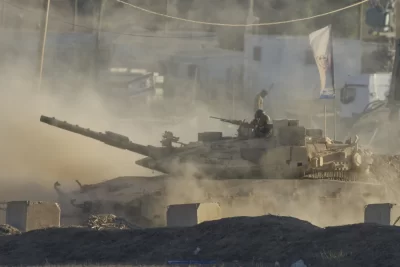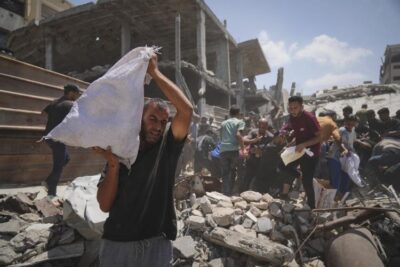
JERUSALEM — Israel’s military announced Sunday it had withdrawn its forces from the southern Gaza city of Khan Younis, wrapping up a key phase in its ground offensive against the Hamas militant group and bringing its troop presence in the territory to one of the lowest levels since the six-month war began.
But defense officials said troops were merely regrouping as the army prepares to move into Hamas’ last stronghold, Rafah. “The war in Gaza continues, and we are far from stopping,” said the military chief, Lt. Gen. Herzi Halevi.
Local broadcaster Channel 13 TV reported that Israel was preparing to begin evacuating Rafah within one week and the process could take several months.
Still, the withdrawal was a milestone as Israel and Hamas marked six months of fighting. Military officials, speaking on condition of anonymity under army policy, said a “significant force” remained in Gaza to continue targeted operations including in Khan Younis, hometown of the Hamas leader, Yehya Sinwar.
AP video in Khan Younis showed some people returning to a landscape marked by shattered multistory buildings and climbing over debris. Cars were overturned and charred. Southern Gaza’s main hospital, Nasser, was in shambles.
“It’s all just rubble,” a dejected Ahmad Abu al-Rish said. “Animals can’t live here, so how is a human supposed to?”
Israel for weeks has vowed a ground offensive in nearby Rafah. But the city shelters some 1.4 million people — more than half of Gaza’s population. The prospect of an offensive has raised global alarm, including from Israel’s top ally, the U.S., which has demanded to see a credible plan to protect civilians. Allowing people to return to nearby Khan Younis could relieve some pressure on Rafah.
White House national security spokesman John Kirby repeated on Sunday the U.S. opposition to a Rafah offensive and told ABC the U.S. believes that the partial Israeli withdrawal “is really just about rest and refit for these troops that have been on the ground for four months and not necessarily, that we can tell, indicative of some coming new operation for these troops.”
Israel’s military quietly drew down troops in devastated northern Gaza earlier in the war. But it has continued to carry out airstrikes and raids in areas where it says Hamas has resurfaced, including Gaza’s largest hospital, Shifa, leaving what the head of the World Health Organization called “an empty shell.”
The six-month mark has been met with growing frustration in Israel, where anti-government protests have swelled and anger is mounting over what some see as government inaction to help free about 130 remaining hostages, about a quarter of whom Israel says are dead. Hamas-led militants took about 250 captives when they crossed from Gaza into Israel on Oct. 7 and killed 1,200 people, mostly civilians.
Several thousand protesters called for a “hostage deal now” at a rally outside the Knesset in Jerusalem, organized by hostages’ families. In southern Israel, weeping relatives gathered at the site of a music festival where more than 300 people were killed on Oct. 7.
“It’s an impossible reality for us, it’s an impossible reality for the Gazans and the people of this country. We just want to live,” said one protester, Talia Ezrahi.
“I would agree to anything to return the hostages and stop the mass killings in Gaza,” said another protester, Michal Fruchtman.
Negotiations in pursuit of a cease-fire in exchange for the hostages’ release were expected to resume in Cairo on Sunday. An Israeli delegation led by the head of the Mossad intelligence agency was going to Cairo, according to an Israeli official who spoke on condition of anonymity because they were not authorized to discuss the matter with the media.
Pressure rose for action now.
“This doesn’t seem a war against terror. This doesn’t seem anymore a war about defending Israel. This really, at this point, seems it’s a war against humanity itself,” chef José Andrés told ABC, days after an Israeli airstrike killed seven of his World Central Kitchen colleagues in Gaza. Aid deliveries on a crucial new sea route to the territory were suspended.




